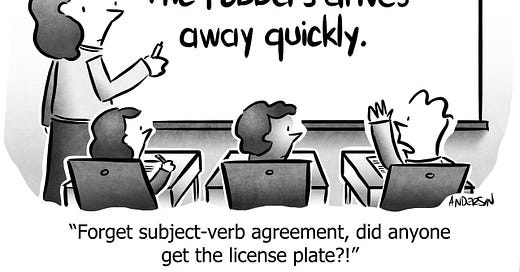Subject-verb agreement errors are an easy way for test makers to trip you up on the SAT and ACT. But with a solid understanding of the rule and a few key strategies, you can spot and fix these mistakes with confidence.
The Rule
A singular subject takes a singular verb, and a plural subject takes a plural verb.
Simple, right? But certain sentence structures can make this trickier than it seems. Let’s break it down.
1. Ignore Words Between the Subject and the Verb
One of the most common tricks on standardized tests is to add extra information between the subject and the verb, distracting you from the real subject.
❌ The box of chocolates were delicious.
“Box” is the subject—not “chocolates.”
✅ The box of chocolates was delicious.
Quick Tip: Cross out the extra information between commas or prepositional phrases to find the true subject.
2. Compound Subjects Joined by “And” Take a Plural Verb
If two subjects are joined by “and,” use a plural verb.
✅ My brother and sister love pizza.
Exception: If the two subjects refer to the same person or thing, use a singular verb.
✅ Mac and cheese is my favorite food.
3. Compound Subjects with “Or” or “Nor” Match the Closest Subject
When subjects are joined by "or" or "nor," the verb should agree with the subject that is closest to the verb (also called the proximal agreement rule).
✅ Neither the teachers nor the student was late.
The subject closest to the verb is student—singular, so we use was.
✅ Neither the student nor the teachers were late.
The subject closest to the verb is teachers—plural, so we use were.
4. Collective Nouns Are Usually Singular
Nouns like team, group, family, and audience are usually considered singular, even though they refer to multiple people.
✅ The team is winning the game.
✅ The family loves spending time together.
5. Indefinite Pronouns Can Be Tricky
Words like everyone, someone, each, and nobody are always singular, even though they sound like they refer to multiple people.
✅ Everyone is excited for the weekend.
✅ Each of the students has a notebook.
Watch Out: Some indefinite pronouns can be singular or plural depending on the context (e.g., all, some, none).
✅ All of the cake is gone.
✅ All of the students are present.
Common Mistakes to Avoid
Tricky Prepositional Phrases
❌ The group of students are waiting.
✅ The group of students is waiting.
Indefinite Pronouns Confusion
❌ Each of the players have a jersey.
✅ Each of the players has a jersey.
Compound Subjects with “Or” or “Nor”
❌ Either my parents or my brother are picking me up.
✅ Either my parents or my brother is picking me up.
The Quick Fix
Find the true subject—ignore extra words or phrases.
Check if the subject is singular or plural.
Make sure the verb matches the subject.
Want More Quick Grammar Fixes?
Subscribe to stay updated, and let me know in the comments which grammar rules trip you up the most!
Check out our previous Quick Grammar Fixes:



